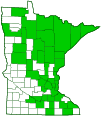Coral Tooth Fungus
(Hericium coralloides)
Conservation • Description • Habitat • Ecology • Distribution • Taxonomy
Conservation Status |
|
|||||||
| IUCN Red List | not listed |
|||||||
| NatureServe | NNR - Unranked |
|||||||
| Minnesota | not listed |
|||||||
Description |
||
There are sixteen species of Hericium, four of which occur in North America, three in Minnesota. Coral Tooth Fungus (Hericium coralloides) is by far the most common of the three. It is fairly common in northeastern United States and in Minnesota. It is found in late summer and fall in deciduous woodlands and forests. It obtains its nutrients from dead wood (saprobic). It grows alone or in small groups on fallen logs, branches, and dead stumps of hardwoods. When young, the fruiting body is knobby and toothless, and it cannot be distinguished from other Hericium species. When mature, it is a loose, openly branched, irregularly-shaped, 3″ to 13 ¾″ wide, 2⅜″ to 6¾″ high cluster of delicate branches rising from a tough, repeatedly branched base. It is white when fresh, becoming creamy-white to buff or yellowish-tan with age. The branches are themselves again intricately branched and have rows of evenly-spaced spines, like the teeth of a comb. The spines are the spore-producing structures of this fungus, corresponding to the gills on many mushrooms (Agaricales). They are ⅛″ to ⅜″ long and hang downward. Sometimes a small tuft of spines at the tip of a branch may have spines up to 1″ long. The flesh is white. It is edible when young and soft, but the spines become brittle with age. The spore print is white. |
||
Similar Species |
||
Bear’s Head Tooth (Hericium americanum) is a tight cluster of many branches with tufts, not rows, of 3 ⁄16″ to 1¼″ long spines. It is uncommon in Minnesota. Lion’s Mane (Hericium erinaceus) is an unbranched, cushion-shaped mass of closely packed spines. The spines are ¾″ to 2″ long or longer. It is rare in Minnesota. |
||
Habitat and Hosts |
||
Deciduous forests and woodlands. Dead fallen logs and stumps of hardwoods |
||
Ecology |
||
Season |
||
Late summer and fall |
||
Distribution |
||||
|
Sources |
|||
| 11/18/2022 | ||||
Occurrence |
||||
Widespread; fairly common in Minnesota |
||||
Taxonomy |
|||
| Kingdom | Fungi (Fungi) | ||
| Subkingdom | Dikarya | ||
| Phylum | Basidiomycota (Basidiomycete Fungi) | ||
| Subphylum | Agaricomycotina (Higher Basidiomycetes) | ||
| Class | Agaricomycetes (Mushrooms, Bracket Fungi, Puffballs, and Allies) | ||
| Subclass | Agaricomycetidae | ||
| Order | Russulales | ||
| Family | Hericiaceae (tooth fungi) | ||
| Genus | Hericium | ||
Coral Tooth Fungus was formerly classified as Hericium laciniatum, then Hericium ramosum. Older texts that used the latter name for this species used the name Hericium coralloides for what is now called Hericium americanum. |
|||
Synonyms |
|||
Common Names |
|||
Coral Tooth Fungus Coral Tooth Coral Tooth Fungus |
|||
Glossary
Saprobic
A term often used for saprotrophic fungi. Referring to fungi that obtain their nutrients from decayed organic matter.
Visitor Photos |
|||||
Share your photo of this fungus. |
|||||
| This button not working for you? Simply email us at info@MinnesotaSeasons.com. Attach one or more photos and, if you like, a caption. |
|||||
Carrie Olson |
|||||
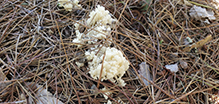 |
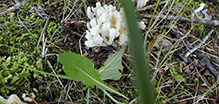 |
||||
Jill Jacobson |
|||||
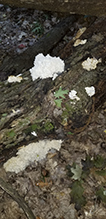 |
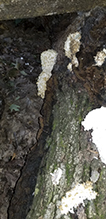 |
||||
Margot Avey |
|||||
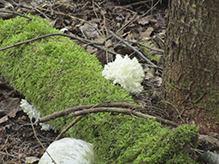 |
|||||
MinnesotaSeasons.com Photos |
|||||
|
|||||

Slideshows |
||

Visitor Videos |
|||
Share your video of this mammal. |
|||
| This button not working for you? Simply email us at info@MinnesotaSeasons.com. Attach a video, a YouTube link, or a cloud storage link. |
|||
Other Videos |
|||
| Foraging for Hericium Coralloides "Comb Tooth mushroom" 330 MaNiaC |
|||
About
Published on Oct 9, 2016 Join me as I forage for Hericium Coralloides also known as Comb Tooth mushroom here in north central MN. Late september is the perfect time of year to look for these delicious choice edible mushrooms. They mainly grow on downed or dying maple trees. Royalty Free Music by http://audiomicro.com/royalty-free-music |
|||
| The Comb Tooth Mushroom Gary Cremese |
|||
About
Published on Sep 15, 2012 I found this rare mushroom while walking the west branch of the Farmington River in Peoples State Forest northwestern Connecticut. I show how to harvest and prepare this mushroom for pickling. I also provide insight to the potential dangers of eating wild mushrooms, along with a detailed account of the medicinal properties of the Comb Tooth Mushroom, the latin name; Hericium Coralloides. |
|||
| Hericium coralloides mushroom hunting Scott Button |
|||
About
Published on Sep 25, 2015 Hericium coralloides, mushroom hunting |
|||
| Comb Tooth Mushroom - Magic Fungi MyBackyardBirding |
|||
About
Published on Jan 4, 2014 The Comb Tooth Mushroom (Hericium coralloides) - A Magic Mushroom if ever there was one - and closely related to the Bear's Head Tooth Mushroom see: I came upon both of these large specimens on a hike in the Great Smoky Mountains last August and I am now a dedicated mushroom watcher - I had never seen such amazing mushrooms. Who knew they could be so fascinating. These are arguably the most stunning fungi one is likely to encounter and they are both highly prized for recipes and medicinal properties. It is said this mushroom tastes like Lobster and is good used in a Chowder! It is also one of the least likely group of mushrooms to be mistakenly identified as they are so unique. The Bear's Head Tooth Mushroom has larger "teeth" that are more like stalactites hanging from a cave roof while the Comb Tooth Mushroom has much smaller "teeth" and looks more like a piece of brain coral. These specimen were at or near peak condition and of course I left it for others to enjoy! http://en.wikipedia.org/wiki/Hericium New HD videos every week. Please Subscribe at: More info at: http://screech-owls.blogspot.com/ |
|||
| Harvesting & Dehydrating the Comb Tooth Mushroom Chris & Kathy |
|||
About
Published on Sep 5, 2016 Harvesting the Comb Tooth mushroom |
|||


Created: 9/22/2017
Last Updated:
